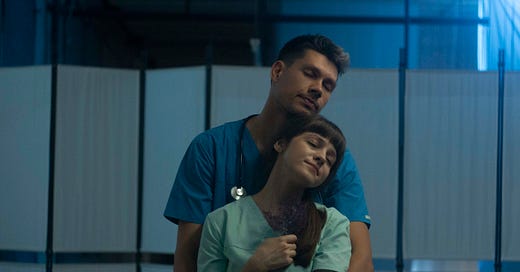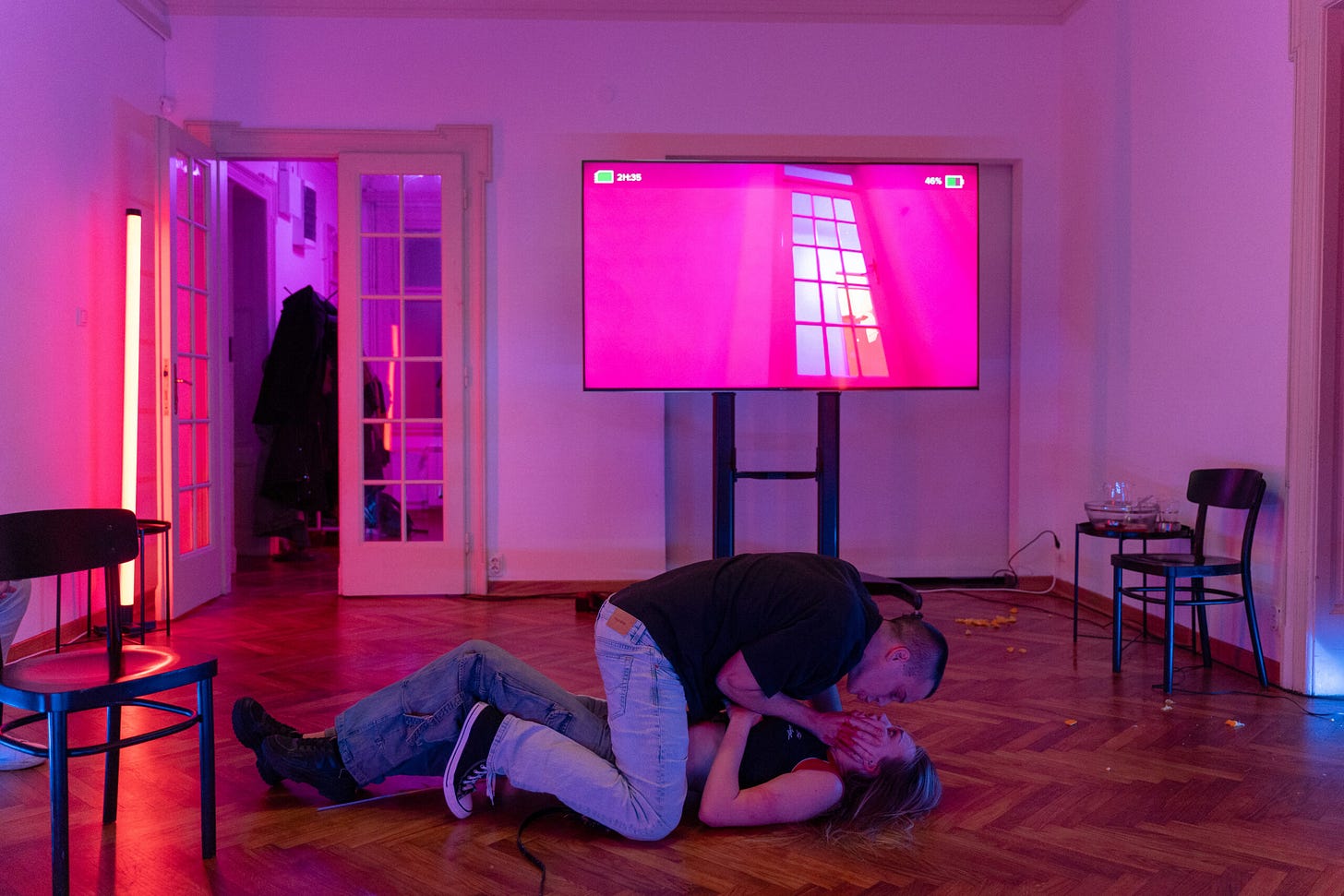Risky business: European theatre makers on the right to fail
Theatre makers from Romania, Italy, Kosovo and Serbia on success, failure and artistic freedom.
Welcome to Café Europa, a weekly newsletter dedicated to European theatre.
This week, in light of a conversation taking place in the UK about risk and the right to fail, I canvassed the opinions of European theatre makers about what constitutes risk for them.
Last week The Stage, the newspaper of the UK theatre industry, published a piece examining the annual accounts of three London theatres in the subsidised sector – Hampstead Theatre, the Young Vic, and the Royal Court. It made for grim reading and created quite a stir on social media.
All three had to dip into their reserves over the 2022/23 financial period. All three suggested that their current programming model would need to be overhauled if they were to survive. One line, in the Royal Court’s annual accounts, stood out: “The business model that has supported the right to fail alongside success is no longer sustainable.”
The Royal Court is synonymous with new writing culture in the UK. For over 60 years, it has produced plays that have expanded the form, many of which have become modern classics: Caryl Churchill’s Top Girls, Sarah Kane’s Blasted, and Jez Butterworth’s Jerusalem. More recently, Caryl Churchill’s Escaped Alone, Laura Wade’s Posh and Lucy Kirkwood’s The Children all premiered there.
It is also a theatre at a place of change, with current artistic director Vicky Featherstone stepping down and the New Diorama’s David Byrne (I wrote about the wonders he worked at the New Diorama for the New York Times) taking over this year. If anyone is equipped to steer a venue like the Royal Court through a period of existential uncertainty, it’s him, especially with immensely capable incoming executive director, Will Young, at his side.
However, as The Stage’s editor Alistair Smith summarised in his editorial, “over the past decade and more, the subsidised sector has been forced to become increasingly commercial to such an extent that, for some organisations, it is now challenging their very raison d’etre.”
He concluded that: “Public funding for the arts can have many worthwhile aims, but if it is not also there to encourage risk-taking, to allow artists the right to fail in the pursuit of creating great art, then, really, what is it there for?”
This prompted me to ask some prominent European theatre makers from Romania, Italy, Kosovo and Serbia about this issue. What constitutes artistic risk in their cultural context? What pressures do they face to succeed? How much space is there to fail?
Romanian theatre maker Andreea Iacob’s promenade performance In Between Homes was presented as part the Ulysses: European Odyssey project last year in a former shoe factory in Cluj.
“First, we should probably start from identifying what success is in the field of arts. If we reduce the examination of arts to the terms of commercial mechanisms, then we are in the wrong from the very beginning. The history of art is full of examples of artists (or works of art) which became acknowledged only in the long term.
Secondly, we should look at what art, and, in our case, theatre, stands for. While theatre as entertainment has a strong position of its own (and it is great to have a good business-style productions, combining celebrities, well known pieces and posh theatres), on the other hand theatre is here for more in-depth undertakings, such as to question us, our inner and outer worlds, our emotions and actions, our relationships with the others, our sense of community or what theatre itself is.
“We must protect art’s right to be a process, not just a final product.”
There are no certainties here. These are territories to be investigated and explored, as art manifests as practice for life. Which brings us to failure. How can we know what and when (and how) art really impacts someone? These acts of (self)reflection are territories of life, where failure lives, as it does in each one of us. We must protect art’s right to be a process, not just a final product, and, therefore, it’s right to feel free to not get it right, to try again and again. If we ask theatre to operate only based on recipes of success, then we take away its core, which is to always question, explore and shake old habits, therefore, to risk. Which is the last thing audiences need right now.”
Jeton Neziraj is Kosovo’s most prominent playwright, author of The Handke Project and, most recently, the ambitious international co-production Negotiating Peace – which I discussed in a previous edition – and the director of production company Qendra Multimedia.
“Having visited Canada a number of times, I was shocked by the fact that the theatres there were stuck in a sort of vicious circle. So, although the public theatres were getting xx% subsidies from the state, they still had to sell tickets for the remaining xx%. This was a necessary criterion, and the failure to meet this criterion was considered a malfunction, one with consequences. And this was a challenge for the theatres, so they found themselves caught in this circle, where they had to produce shows that adhered equally to themes that were repeated season after season, but which the audience loved and were familiar with. I think this is a bad example of a theatre life which is ruled by commercialism, a sort of censorship of its own.
I have often deployed the metaphorical phrase "the theatre in Kosovo has only one bullet left," by which I am referring to the limited financial and infrastructural conditions in which theatre operates in Kosovo. Since we have “one bullet left,” we must make sure that the few performances we produce have an impact on the public. But even with this "one bullet" one can fail, and one often does. Failure is part of artistic growth. Without these failures, one cannot expect both personal and general theatre development. The opposite would produce 'sterilization' of the theatre, and its entry into matrices which are suffocating and censoring. Moreover, I believe that the 'option to fail' is and should be part of artistic freedom, and not only a conditional right.”
Actor and dramaturg Agata Tomšič is the co-founder of Italian company ErosAntEros, alongside director Davide Sacco. In 2018 they launched the POLIS Teatro Festival, an annual international festival in Ravenna.
“I start from the premise that for me culture, and in particular art, is a public good and as such should be supported economically by our societies, made accessible to the entire population and protected from censorship and political interference. I also believe that art should be supported by public taxpayers’ money and be free in content and form, free therefore to experiment and “fail”, and then do it and do it again. I therefore believe there is a great political responsibility behind this right and freedom, which should not be underestimated.
The continuous cuts that the performing arts sector in Italy has suffered started several decades ago with the Berlusconi governments, following the belief that the performing arts sector has to deal with the market.. The current Meloni government has not made cuts, but they are very concerned about the “cultural hegemony of the left” and we are all waiting to find out what they will do to address their fears.
I believe that the political and democratic crisis that Europe is experiencing is linked to the growing disinterest of politics in investing in art. This is a boomerang. There are less and less voters, and if the ruling class has the primary goal of maintaining its position of power through more voters, it often chooses the easiest way to reach as many people as possible: commercial entertainment, which is also economically “more sustainable”. Over the long term, however, in this way, spectator-voters stop developing any form of critical and civic thinking, and therefore no longer feel the need to do their duty as citizens (go to vote, pay taxes, etc.), nor do they develop the necessary tools to distinguish an art product from a commercial product, a professional performance from an amateur work, to understand the value of risk and fragility in the artistic field.
Since 2019, at the POLIS festival, we have been developing a participatory project of active citizenship through theatre, an exercise in democracy and openness to contemporary theatrical experimentation. Through a public call, every winter we bring together a group of about 40 people of different ages and backgrounds to choose two of the shows that we will programme at the festival, selecting them from among the approximately 400 proposals that apply each year on video to a national call. These are performances produced in the last two years in Italy, mostly by very young independent and emerging groups.
The people taking part in the project confront themselves with these forms, discuss them, and for each show they see, they produce feedback. The selection process is therefore a long one, but it is only through confrontation and respect for others that it is possible to arrive at a common choice on behalf of the whole group.”
Patrik Lazić is a playwright, director and associate at Serbian cultural NGO Heartefact. His most recent show, Climax, co-created with Dunja Matić, was inspired by Gaspar Noe’s 2018 film.
“In Heartefact, we believe that the right to make mistakes is an artist's fundamental right and the only way they can progress both as a human being and as an artist. We don't want to further mystify the artist's work, but there is absolutely no formula by which you can guarantee the success of an artistic process. There are so many examples when it seemed that the ideal combination of everything had come together: an excellent play, an award-winning director, a phenomenal cast and collaborators, and the result was – nah! So, how can you be sure of the success of the process? Or is the plan to sanction a mistake? That would be even more terrible.
Although all of this has now been verbalized so clearly, this trend has been present in recent years in institutions, even in Serbia. That's why at Heartefact we try to make a space for trying and making mistakes. For example, there is no limit to how long a process can last (it lasts as long as it takes for everyone involved in the process to be satisfied with the result). We also organize residencies that are exclusively dedicated to the process of learning and developing, and do not intend to produce any result. And most importantly, we give emerging artists a space to try something completely different than they did before, to do their own projects, for example. Because we believe that creative and forward-thinking individuals we want to support deserve that chance - to try and fail—so that the cultural and public space is diversified, enriched, and more accepting towards differences.”
This week in European theatre
A round-up of festivals, premieres and other exciting upcoming events over the next seven days
This is Not an Embassy (Made in Taiwan) – The latest show by German collective Rimini Protokoll explores Taiwan’s international status. Created by Stefan Kaegi following a residency at the Taipei National Theatre, the show will feature contributions from a retired ambassador and a digital activist. It opens in at Berlin on 24th January and I’ll be covering it in a future edition of The Stage.
A Family Business – Chris Thorpe’s show - a companion piece to Talking About the Fire, presented at the Royal Court in December and discussed in a previous edition - explores the threat posed to the world. by nuclear weapons. Directed by Claire O’Reilly, it’s at Les Théâtres de la Ville de Luxembourg between 24th-25th January as part of a European tour.
Brandhaarden – Under the title 'From Athens to Amsterdam', the annual international theatre festival will join forces with Greece’s Onassis Stegi – profiled recently in The Stage - fortwo weeks of contemporary Greek theatre, including Sister Sylvester and Nadah el Shazly’s Constantinopoliad, Mario Banushi’s Goodbye Lindita and Anestis Azas and Prodromos Tsinikoris’s Romáland. The festival runs from 30th January to 10th February at ITA.
Thank you for reading! If you enjoyed this newsletter, then please consider sharing it. If you really enjoy it and want to become a paid supporter, that would be lovely. It really makes a difference. The newsletter is a pleasure to write, but it is a lot of work. This year, as promised there will be more bonus editions for paid subscribers. As is the way these days, I also have a Ko-fi account if you want to make a one-off payment. If you have any feedback, you can reach me on natasha.tripney@gmail.com







